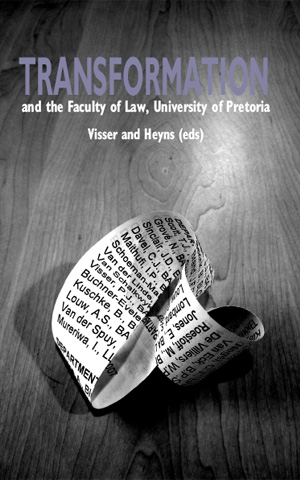Transformation and the Faculty of Law, University of Pretoria
Edited by Hans Visser and Christof Heyns
2006
ISSN:
Pages:75
Print version: Available
Electronic version: Free PDF available
About the publication
In memoriam: Hans Visser
26 November 1953 ~ 14 June 2007
It is important to note at the outset that, as joint editors of this compilation, we disagree fundamentally on some of the issues addressed here. Some of these differences are known in the Faculty. Nevertheless, we do agree on the need for an ongoing and honest discussion of the issues and it is in this spirit that we join forces to create this platform.
This publication contains essays on transformation and the Faculty of Law of the University of Pretoria. All of the authors are all attached to the Faculty and express their personal views. The initiative behind this publication is an informal conversation after a Faculty Board meeting in June 2006 when we were both brought strongly under the impression that members of the Faculty will have to contribute to placing on a different plane the way in which we present ideas and differ from each other concerning the activities and interests of the Faculty. We invited our colleagues to submit essays on the important and controversial question of transformation in relation to the Faculty. This compilation represent the reactions we received to our invitation. We thank all the authors for their valuable efforts and their willingness to be part of a pioneering exchange which could develop into a better understanding of the challenges in developing and managing transformation in a responsible way.
The essays are arranged in alphabetical order according to the names of the authors and cover a variety of issues from different perspectives. They make for interesting — and in some instances provocative — reading. The essays include the subjective views and experiences of the authors — and, as could be expected from lawyers — in certain cases also legal analysis. We hope that this opportunity to air views, concerns and aspirations will make a contribution to the ongoing process of trying to establish what ‘transformation’ should mean in the context of an institution such as our Faculty, and perhaps also in the broader context of our country. We also hope that it will serve as an opportunity to take the debate to a different level — one of openness to reconsider one’s views and those of others. We are not looking for ‘final solutions’ — but rather to making a contribution to the way in which we proceed from where we are now.
Not all change can be described as ‘transformation’. According to the New Oxford Dictionary (2001), transformation means a thorough or dramatic change in form, appearance or character. Transformation is also defined as a ‘complete change’. The Handwoordeboek van die Afrikaanse Taal (HAT) (2005) explains ‘transformasie’ as: ‘’n Gedaanteverwisseling; die oorbring in ‘n ander vorm; verandering in die samestelling van iets’ (‘A change in appearance; changing into other form; a change in the composition of something’). It also reflects something of the political meaning in the contemporary context: ‘Die transformasie van die staatsdiens deur die aanstelling volgens ander kriteria betreffende ras en seks’ (‘Transforming the civil service by making appointments in accordance with other criteria regarding race and sex’). The concept of ‘transformation’ should not be confused with the many other mechanisms of change — although overlap is possible. The following are examples of some methodologies of change: revolution, evolution, renovation, elimination, renaissance, reformation, modernisation, restructuring, conversion, rationalisation, modification, addition, deletion, reconfiguration, reorganisation, rearrangement, re-orientation, revision, correction, upgrading, variation, adjustment, amendment, or a shift of emphasis or in priorities.
If transformation denotes ‘complete change’, it is clear that an acceptance of the idea that the Faculty has to be transformed entails a process in terms of which the comfort of some certainties will have to be discarded. This is bound in many ways to be an uncomfortable and, indeed, disquieting process.
We hope that these pages will provide some insight into the way in which individual staff members see transformation — and that they will contribute to the way in which we interact on such contentious issues.
Table of Contents
- Preface and introduction
- Abdul Funnah
- Michelo Hansungule
- Christof Heyns
- Tshepo Madlingozi
- Caroline Nicholson
- Annette van der Merwe
- Karin van Marle and Danie Brand
- Hans Visser
Keywords:
